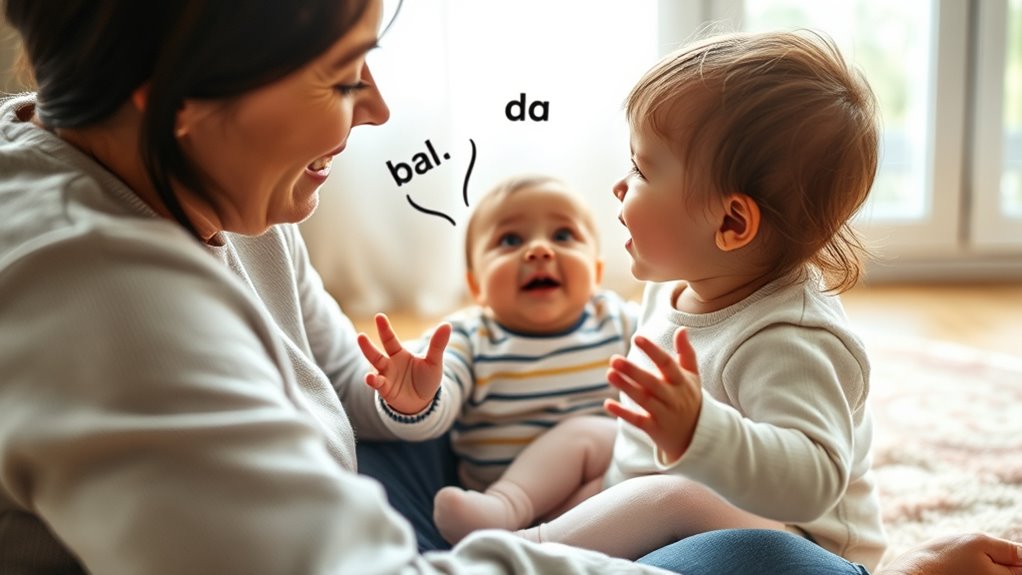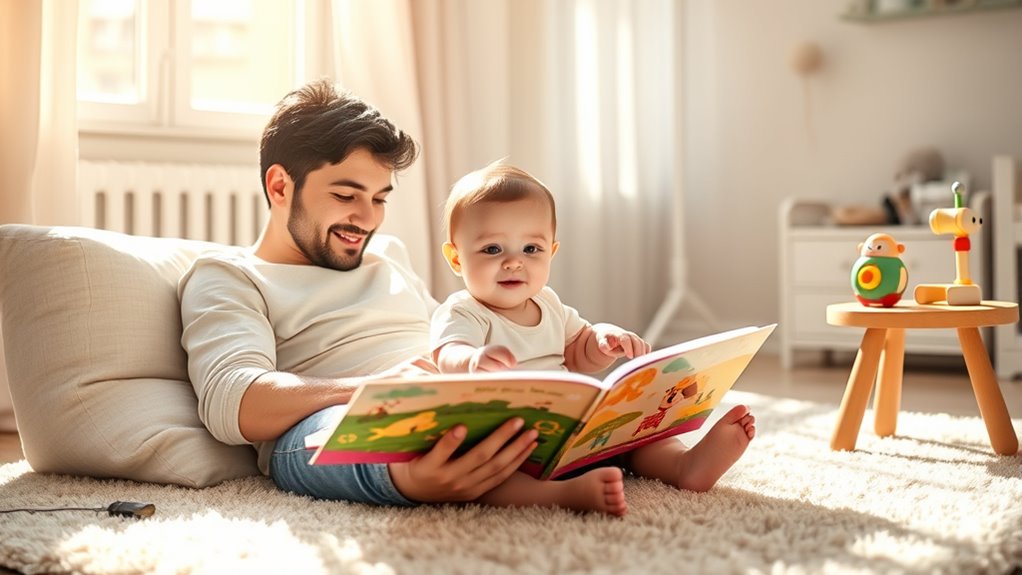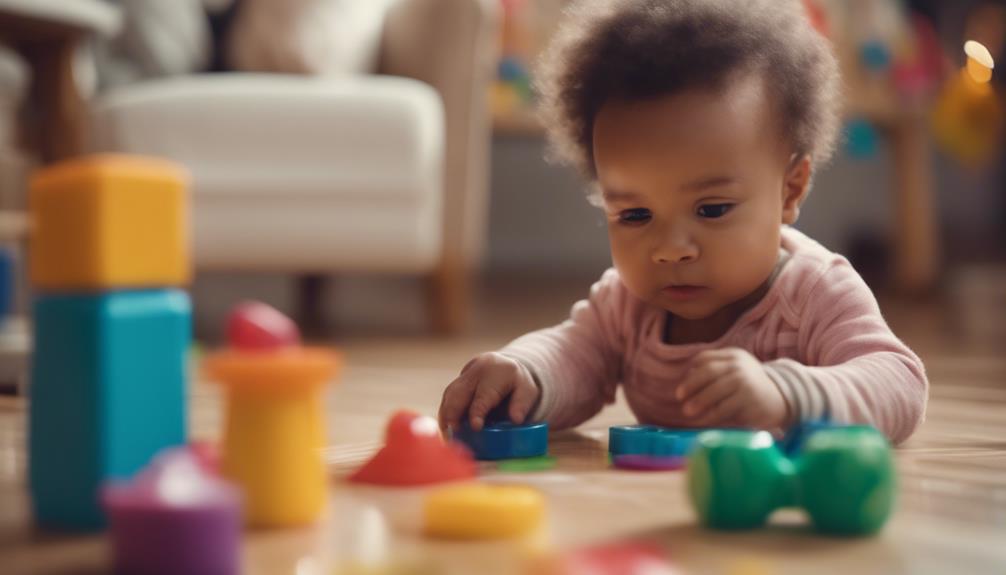To encourage babbling and early words, create a rich language environment by talking often, describing actions, and using sign language. Engage your baby in conversations with gestures and enthusiastic responses. Repeat simple words and encourage imitation through playful routines. Incorporate reading books and singing songs with actions, rhythm, and repetition. Make sound play fun with animal noises and exaggerate voices. Keep these engaging activities consistent to support your baby’s speech development and discover more effective ways to foster their language skills.
Key Takeaways
- Talk to your baby frequently, describing actions and objects to promote language exposure.
- Use gestures and sign language alongside speech to reinforce understanding and encourage imitation.
- Sing songs and read colorful books with repetitive phrases to stimulate babbling and early word development.
- Respond enthusiastically to your baby’s sounds and babbles, modeling correct words and encouraging imitation.
- Incorporate playful sound games and animal noises into daily routines to make language learning engaging and fun.
Create a Rich Language Environment

Creating a rich language environment is essential for encouraging your baby’s babbling and early words. Talk to your baby often, describing what you’re doing and naming objects around you. Incorporate sign language and gesture encouragement to help your little one connect words with actions. Using simple signs like “more,” “milk,” or “all done” can boost understanding and motivate your baby to communicate. Be patient and consistent; babies learn through repetition and exposure. Sing songs, read books aloud, and respond enthusiastically to your baby’s sounds to reinforce their efforts. Incorporating visual cues can further enhance language development and help your baby make meaningful connections. Engaging in responsive parent-child interactions fosters a secure environment for speech growth. Additionally, exposing your baby to a variety of sounds and words in different contexts can stimulate their vocabulary expansion and curiosity about language. For example, playing with water and describing the sensations and actions can also promote early communication skills. Engaging in conversations that include educational toys with sound and speech features can further support their listening and speaking abilities. Avoid pressuring your baby, but create a positive, engaging atmosphere filled with language. This environment lays a solid foundation for their speech development and helps your baby feel confident in exploring communication.
Engage in Interactive Communication

Have you ever noticed how your baby responds more enthusiastically when you engage in back-and-forth conversations? Interactive communication is key to encouraging babbling and early words. Use gestures like pointing or waving to support your words, which helps your baby understand and participate. When your baby makes sounds or gestures, offer responsive feedback—smile, imitate, or expand on their actions—to reinforce their efforts. This back-and-forth exchange builds their confidence and language skills. Keep your tone lively and expressive, making it clear that communication is fun and rewarding. Remember, your active involvement, combined with gestural communication and responsive feedback, creates a stimulating environment that motivates your baby to explore sounds and words. Incorporating responsive feedback enhances their learning process and encourages them to experiment with new sounds. Additionally, creating opportunities for your baby to observe and imitate common early words can further boost their language development. Considering the importance of language-rich interactions, regularly engaging your baby in meaningful conversations can significantly support their speech milestones. Using a variety of baby-friendly toys and objects during conversations can also make these interactions more engaging and memorable for your little one.
Use Repetition and Imitation Techniques

Repetition and imitation are powerful tools to help your baby learn new sounds and words. Using repetition strategies, you can consistently model simple words or sounds, encouraging your baby to mimic them. Repeat words often during daily routines, like “milk,” “bye-bye,” or “dog,” to reinforce learning. Imitation practices involve actively copying your baby’s sounds and encouraging them to imitate yours. When your baby babbles or makes sounds, respond enthusiastically and repeat those sounds back to them. This back-and-forth creates a positive feedback loop that boosts their confidence and promotes language development. Remember, consistency is key—frequent repetition and imitation help your baby internalize new words and develop early communication skills effectively. Additionally, paying attention to your baby’s developmental milestones can help you tailor your interactions to support their speech growth optimally. Recognizing their social engagement can also motivate them to practice new words in a natural setting. Incorporating positive reinforcement further encourages your baby to continue practicing their emerging speech skills. Engaging in interactive play can also enhance their motivation to communicate and experiment with sounds. Moreover, understanding the importance of early language exposure helps create a rich environment that fosters speech development.
Read Books and Sing Songs Together

Reading books and singing songs together introduce your baby to new sounds and words in a fun, engaging way. Use storytelling techniques to make stories lively, animated, and interactive. Incorporate musical activities to enhance language learning and keep your baby interested. Here are four ways to maximize this time:
- Choose colorful, rhythmic books with repetitive phrases to encourage babbling.
- Sing simple songs with catchy melodies and clear lyrics.
- Use gestures and facial expressions to reinforce understanding.
- Pause during stories or songs to allow your baby to imitate sounds or words.
These activities stimulate your baby’s auditory and vocal development, making language learning enjoyable. Consistent exposure to storytelling techniques and musical activities helps foster early speech and confidence in communication.
Encourage Playful Sound Making

Encouraging playful sound making helps your baby explore their vocal abilities and develop early communication skills. Engage in fun sound games by making silly noises, imitating animal sounds, or using exaggerated voices. This playful interaction encourages your baby to mimic sounds and experiment with their voice. Don’t be afraid to use silly voice play—loud, high-pitched, or deep voices—to capture their attention and make the experience enjoyable. These activities boost their confidence in trying new sounds and foster a positive attitude toward communication. Keep the tone light and fun, and respond enthusiastically to their attempts. Using appropriate spray tips can help create a smooth, enjoyable experience for your baby as they experiment with sound. Additionally, incorporating smart toilets’ hygiene features into your routine can promote a clean environment that supports your child’s health and comfort during developmental activities. Recognizing the importance of early language development can further motivate you to engage regularly in these playful sound exchanges. Incorporating playful sound making into your daily routine can also enhance their overall communication skills. Through these playful exchanges, your baby will feel encouraged to babble more and begin forming early words naturally.
Frequently Asked Questions
When Should I Start to Worry if My Baby Isn’t Babbling?
If you’re worried your baby isn’t babbling yet, it’s natural to have concerns about a speech delay. Usually, babies start babbling around 4 to 6 months, but each child develops at their own pace. If your baby hasn’t begun to babble by 9 months or shows no signs of early communication, it’s a good idea to discuss your parent concerns with a pediatrician. Early intervention can be very helpful.
How Can I Tell if My Baby’s Sounds Are Developmentally Typical?
Your baby’s sounds are like a roadmap to their growth, helping you spot speech milestones. You’ll want to observe for developmental red flags, such as limited sounds or lack of response to speech. Usually, by 12 months, babies should babble and imitate sounds. If your baby isn’t meeting these milestones or shows little interest in communication, consult a pediatrician to ensure their development stays on track.
Are There Specific Activities That Boost Early Word Development?
You can boost early word development by engaging in specific activities like interactive reading and singing songs. When you read aloud with your baby, point to pictures and name them to encourage language comprehension. Singing songs with repetitive phrases helps your baby recognize sounds and words. These activities create a fun, supportive environment that naturally promotes your baby’s early language skills and encourages them to start babbling and using words.
How Much Screen Time Is Appropriate for Language Development?
You should follow screen time guidelines that recommend limited and age-appropriate use for your baby. Excessive screen time can hinder language development, so focus on creating language-rich environments instead. Engage in face-to-face interactions, talk, sing, and read with your little one. These activities promote early words and babbling, supporting natural language growth without the distractions of screens. Keep screens to a minimum for ideal development.
Can Environmental Noise Levels Affect My Baby’s Speech Development?
Coincidentally, the environment around your baby can impact their speech development. Too much background noise may make it harder for them to focus on sounds and words, delaying their progress. Quiet environments help your little one listen, imitate, and learn more effectively. By minimizing background noise and creating calm, quiet spaces, you support their ability to hear and produce speech sounds, encouraging early words and clearer communication.
Conclusion
By creating a rich language environment, engaging in interactive communication, and encouraging playful sounds, you set the stage for your baby’s language development. Reading books and singing songs together act as gentle catalysts, much like sunlight nurturing a seed. Remember, your consistent effort and patience turn everyday moments into opportunities for your little one to babble and learn words. With your support, their language skills will bloom beautifully, like a garden thriving under caring hands.









